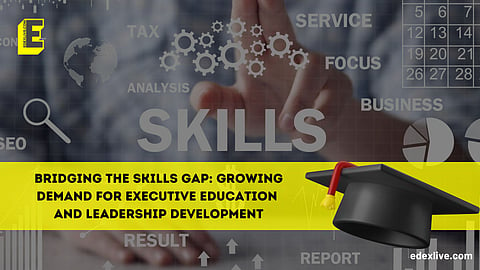

Amidst the challenges of today’s job market, continuous learning and upskilling have become imperative for ensuring long-term employability. Professionals aiming for leadership roles must constantly expand their knowledge and refine their cross-functional skills to stay ahead. Executive education has emerged as a vital enabler for professionals aspiring to high-calibre leadership roles and accelerated career advancement.
These programmes are meticulously designed to equip executives and business leaders with the pragmatic competencies needed to progress to the next phase of their careers.
As more professionals recognise the intrinsic value of such programmes, enrollment in executive education at leading business schools is steadily increasing.
This heightened demand originates not only from working professionals but also from organisations that are constantly on the lookout for talent endowed with a robust theoretical foundation, contemporary practical insights and a profound understanding of the business landscape.
Fortune Business Insights reports that the global executive education market — valued at US$237 billion in 2021 — is projected to expand at a compound annual growth rate of 11.7% by 2028, with India playing a pivotal role in this growth.
What, then, is driving this remarkable expansion?
The rapid pace of technological innovation and advancements across diverse sectors has compelled both organisations and individuals to venture beyond their comfort zones.
Emerging disciplines such as Artificial Intelligence (AI), Machine Learning (ML) and Data Science (DS) have risen to prominence, highlighting the necessity for leaders to understand and strategically harness these innovations in their day-to-day business operations.
While it is not incumbent upon leaders to become technical experts in these fields, they must grasp the broader implications and learn how to leverage these technologies to achieve strategic objectives. Moreover, organisations — regardless of their size — must adopt robust cybersecurity measures and it is essential for leadership to comprehend the associated challenges and industry best practices to implement effective, timely solutions.
Similarly, as global leaders confront challenges like climate change, there is an urgent need for agility and innovation in responding to emerging trends and disruptions.
Senior managers and department heads, often holding postgraduate qualifications in management and backed by extensive work experience with global brands, are increasingly tasked with leading teams in entirely new roles. In light of these dynamics, investing in a pertinent executive education programme is not merely a choice but a strategic imperative.
In addition to the pressing need for upskilling, the current volatile job market and swiftly changing workplace scenarios present significant challenges — particularly for mid-career professionals. To reinvent their careers, stay relevant in their organisations and stay abreast of the latest technological developments, many are turning to executive and leadership development programmes.
These initiatives offer not only career longevity and higher remuneration but also provide access to coveted leadership positions.
Collaborations between businesses, educational institutions and edtech platforms have emerged as another crucial driver behind the burgeoning demand for executive education. These synergistic partnerships have accelerated in recent times, enabling employees to access high-quality, bespoke executive and leadership programmes through flexible, hybrid learning modes. Notably, IIM Amritsar’s Executive MBA programme is at the forefront of bridging these skills gaps and cultivating the next generation of visionary leaders.
By offering a closely industry-aligned curriculum and an innovative pedagogy that nurtures contemporary competencies, the programme equips executives with the strategic tools required to navigate modern business challenges.
This transformative approach not only meets the critical demands of today’s dynamic market but also fosters a culture of continuous learning and leadership excellence within organisations.
At the organisational level, these collaborations pave the way for forging strategic partnerships with edtech platforms that deliver bespoke learning content tailored to evolving business needs, thereby providing a competitive edge and propelling career growth within the workforce.
As the business evolves into an increasingly competitive and complex digital-first arena, the need for highly qualified, agile and visionary leaders continues to escalate.
Programmes like these addresses this demand by equipping both professionals and organisations with the essential tools and resources to excel in an ever-changing global environment.
(Dr Vartika Dutta is the Chairperson, Executive MBA (EMBA) at Indian Institute of Management (IIM) Amritsar. Views expressed are her own.)
